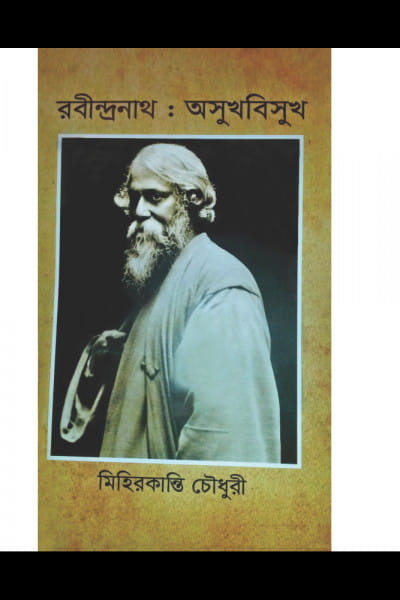Rabindranath: Ashukh Bishukh

Rabindranath: Ashukh Bishukh is an outside-the-box but well-written book on Rabindranath Tagore by Mihirkanti Choudhury, an eminent author and researcher who has so far penned a prestigious number of scholarly publications including Haunting Rays: Tagore Miscellany, Tagore's Passage to Germany, Tagore's Works in European Languages, The Oriental Sun and so on. In Rabindranath: Ashukh Bishukh the author has touched upon the health hazards that affected Rabindranath Tagore and his family a number of times while the poet was alive. The psycho-physical maladies that troubled Rabindranath Tagore at home and abroad have been addressed in this book. Most of the readers are familiar with the biography and literary creations of Rabindranath Tagore, but there are very few people who make efforts to look into the diseases the greatest ever Bengali poet had to live through. Moreover, these diseases had a broad impact on some of the stories and poems by Rabindranath Tagore. So, Rabindranath Tagore's health-related issues moved beyond his body on some occasions and secured a place in his literary works too.
According to this book, Rabindranath Tagore fell sick several times while he was travelling overseas. He was invaded by severe sea sickness during his sea voyage to London in 1878. A similar form of illness knocked him down for some days during another trip to London in 1890. An acute influenza sickened Rabindranath Tagore in 1924 while he was travelling to Argentina. Diseases came back to imperil Rabindranath Tagore once again in 1928 and this time it happened in the middle of his holidays in Ceylon (present day Sri Lanka). A mild cardiac problem jeopardized him in 1930 while he was in the United States on his last trip to that country. Rabindranath Tagore wrote letters to some of his nearest people describing his physical predicaments, this book tells us. As found in this book, the poet had a special leaning towards homeopathic and herbal treatments.
During the era of Rabindranath Tagore medical science had made much progress but still it was not as fast and efficacious as it is in the present world. Lots of diseases such as cholera, typhoid, malaria, flu, and uremia were difficult to be treated. So, diseases known as mild problems today used to cause big health damages during the middle of 20th century and earlier times. Some family members of Rabindranath Tagore were also immensely distressed by such diseases as narrated in Rabindranath: Ashukh Bishukh. In Rabindranath Tagore's autobiographic book My Boyhood Days, the poet recalled some of the diseases that got hold of him during his tender age.
Some other famous authors and poets also struggled with various diseases. Anton Chekhov suffered from tuberculosis all his life and finally he succumbed to this disease. George Orwell was also trailed by this ailment throughout his life. Joseph Conrad was frequently assailed by gout, neuralgic pain and toothache. Sylvia Plath suffered from an incurable form of depression all her life which afterwards compelled her to commit suicide. Robert Louis Stevenson had chest pain, cough and chronic fevers as long as he lived. Rudyard Kipling had persistent intestinal problems and some bronchial diseases continued to pester D.H. Lawrence till his death.
Mihirkanti Choudhury, the author of the book Rabindranath: Ashukh Bishukh is a widely appraised biographer of Rabindranath Tagore, particularly among readers with deep inquisitions about Tagore's life beyond literature. Some of his books on Rabindranath Tagore have been published by Lambert Academic Publishers, Germany. In professional life, Mihirkanti Choudhury is Deputy Registrar in Metropolitan University, Sylhet and a veteran pedagogue of English language. In Rabindranath: Ashukh Bishukh, Mihirkanti Choudhury has worked on such an angle of Tagore's life which has been so far highlighted by very few authors. The connection between ailments and literature as far as Tagore is concerned and the range of references cited by the writer in Rabindranath: Ashukh Bishukh has made the book a highly informative, insightful and entertaining authorial feat.
Kahlil Gibran wrote in his masterpiece The Prophet, "Much of your pain is the bitter potion by which the physician within you heals your sick self." Pains and sufferings bridge up human souls with God, "the physician within you" as stated by Kahlil Gibran with a spiritual allegory. Most of the physical and mental hardships confronted by Tagore enhanced and deepened his authorial and poetic dexterity and his ailments could not curtail his power to create classical stories, plays and verses. The agonies caused by corporeal maladies cure the indispositions within us and sanctify our thoughts and visions. Sufferings are a test of one's worth and capability to stand before life with an intrepid heart. All pangs of life leave a lesson to learn to boost the spirit with which we keep on striving for progress and enlightenment.
The reviewer is Senior Lecturer, Department of English, Metropolitan University, Sylhet.

 For all latest news, follow The Daily Star's Google News channel.
For all latest news, follow The Daily Star's Google News channel. 



Comments